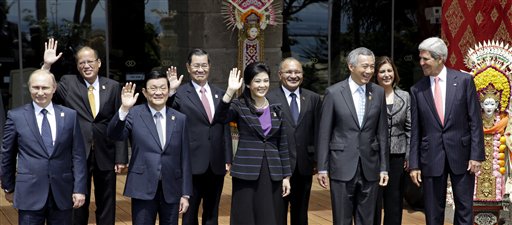
Leaders of the Asia-Pacific region, front left to right, Russian President Vladimir Putin, Vietnamese President Truong Tan Sang, Thai Prime Minister Yingluck Shinawatra, Singapore’s Prime Minister Lee Hsien Loong, U.S. Secretary of State John Kerry, and back left to right, Philippine President Benigno Aquino III, Taiwan’s former Vice President Vincent Siew, Papua New Guinean Prime Minister Peter O’Neill, and Peruvian Foreign Minister Eda Rivas, stand for a group photo session during the Asia-Pacific Economic Cooperation (APEC) forum in Bali, Indonesia, Tuesday, Oct. 8, 2013. Kerry and Rivas were filling in for their respective country leaders. AP Photo
NUSA DUA—The United States stepped up efforts to reinforce its economic might in the Asia-Pacific at a regional leaders’ summit in Indonesia on Tuesday, amid warnings from an increasingly bold China.
The two-day Asia-Pacific Economic Co-operation (APEC) event at a five-star resort on the tropical island of Bali is aimed at breaking down trade barriers among all 21 member economies, but rival agendas by the world powers have overshadowed the talks.
Filling in for US President Barack Obama, Secretary of State John Kerry has lobbied for the quick signing of a mega free trade pact grouping 12 APEC nations but not China and summit host Indonesia.
“We need modern rules for a changing road, rules that keep pace with the speed of today’s markets,” Kerry said in a speech on the sidelines of the summit on Monday that was in large part a hard-sell for the planned Trans-Pacific Partnership.
Kerry was set to meet the leaders of the 11 other nations involved in the TPP on Tuesday afternoon in a bid to hit an against-the-odds deadline set by Obama for a deal by the end of this year.
The United States has championed the TPP as setting “gold standards” to deal with complex changes to the 21st-century economy, such as how to police cloud computing and patents.
But China and even some developing nations included in the TPP have expressed concern that it will set down trade rules primarily benefiting the richest countries and most powerful firms.
“China will commit itself to building a trans-Pacific regional cooperation framework that benefits all parties,” Chinese President Xi Jinping said in a speech following Kerry at the APEC business forum.
“We should enhance coordination… deepen regional integration and avoid the spaghetti bowl effect so as to build closer partnerships across the Pacific.”
Xi’s comments were interpreted in China’s state-run media on Tuesday as direct criticism of the TPP.
“The Trans-Pacific Partnership, featuring confidential talks and the highest free trade standard beyond mere lower tariffs, is widely considered a new step for the US to dominate the economy in the Asia-Pacific region,” the China Daily newspaper said in a front-page report on Xi’s speech.
Indonesia also signalled its irritation at the huge focus on TPP at the APEC summit, shunting the planned meeting on Tuesday afternoon of the 12 nations involved to a hotel outside the official venue.
“We mind actually, and one of the reasons, at the very least, is we don’t want any coverage that will overshadow APEC,” an Indonesian government official told AFP, when asked about why the TPP countries had been told to meet outside.
Meanwhile, China and Indonesia are involved in plans for a rival free trade pact involving 16 countries around the region and being spearheaded by the Association of Southeast Asian Nations.
Negotiations for that pact are expected to be discussed at an East Asia Summit in Brunei this week.
One of the biggest issues at APEC has been the absence of Obama, who had to cancel an Asian tour that would have also taken him to Brunei, Malaysia and the Philippines because of the week-long US government shutdown.
Obama and the Democrats are engaged in a potentially catastrophic battle of nerves with the Republicans over the president’s health care law, which could lead to an unprecedented US default.
Obama’s decision not to come to Asia has reinforced sentiments that his high-profile diplomatic, economic and military focus on the region, known as the “pivot”, is in tatters.
Kerry has been forced at APEC to repeatedly insist that the Asia-Pacific remains a top priority.
“I want to emphasize that there is nothing that will shake the commitment of the rebalance to Asia that President Obama is leading,” Kerry told the business forum on Monday.
Meanwhile, Xi filled the Obama vacuum with high-profile state visits to Jakarta and Kuala Lumpur ahead of APEC.
He then used the APEC business event to outline a Chinese vision for the region of a “united and prosperous” family.

